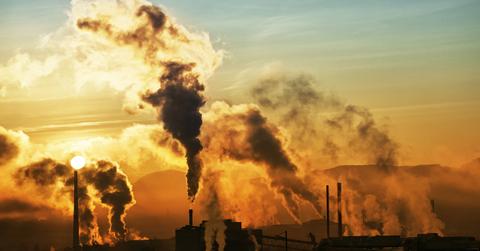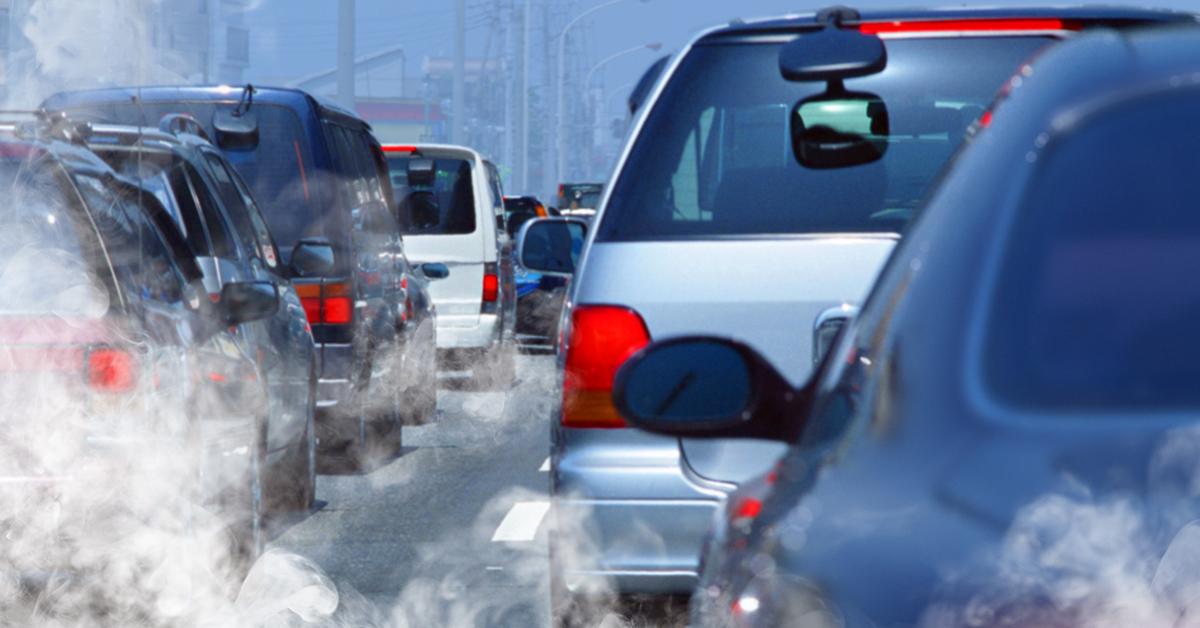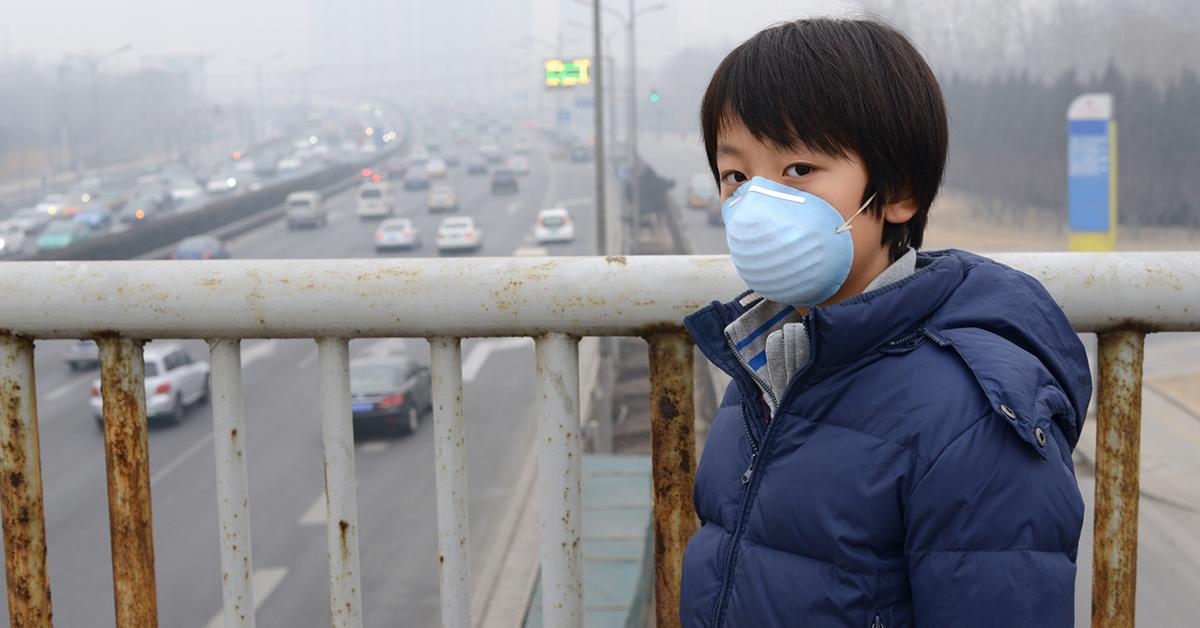This Is How Air Pollution Impacts the Human Body
Pollution affects everyone and everything — from our environment to animals to humans. It’s not just detrimental to one area of life; it can be dangerous for all of it.
Updated Nov. 19 2020, 9:38 p.m. ET

Pollution affects everyone and everything — from our environment to animals to humans. It’s not just detrimental to one area of life; it can be dangerous for all of it. Pollution occurs when an environment is contaminated with something that negatively affects the natural order of the environment. Any environment can be affected — from oceans and soil to the atmosphere.
That brings us to air pollution. In recent years, the state of our oceans has been in the forefront of everyone’s minds and media coverage, as plastic pollution is becoming a huge issue in our oceans and waterways. But it’s important to pay attention to air pollution, too. In fact, there are five main types of pollution and it’s crucial to pay attention to all of them: water, soil, light, noise, and air pollution.
According to Business2Community, there are nine main contaminants that make up air pollution; these are ozone, carbon monoxide, sulfur dioxide, lead, nitrogen oxides, particulate matter, carbon dioxide, methane, and chlorofluorocarbons. According to National Geographic, most of these air pollution contaminants are created by people, but did you know that these emissions can also harm the people that created them?
Keep reading to find out how air pollution affects humans.
Why Is Air Pollution Harmful?

Air pollution is caused by nine main contaminants: ozone, carbon monoxide, sulfur dioxide, lead, nitrogen oxides, particulate matter, carbon dioxide, methane, and chlorofluorocarbons; each of these toxins is associated with negative impacts.
Carbon dioxide is a greenhouse gas that most significantly affects global warming and, therefore, climate change. A byproduct of respiration, carbon dioxide is totally natural, but when too much of it gets trapped in the Earth’s atmosphere, it causes the average global temperature to warm. This causes a host of complications for the planet, including extreme weather events, the destruction of natural habitats such as coral bleaching, and so much more. Though it is a natural byproduct of respiration, CO2 also is released when fossil fuels are burned, resulting in an excess of CO2 in the atmosphere.
Carbon monoxide emissions occur mainly as a result of transportation sources. As we all know from having carbon monoxide detectors in our homes, carbon monoxide is extremely toxic. Overexposure to carbon monoxide impedes oxygen delivery in the body and causes death.
Since outlawed because of their harmful effect on the atmosphere’s ozone layer, chlorofluorocarbons (CFCs) used to be used in aerosol spray cans. Essentially, CFCs enter the stratosphere and create an environment that makes it easier for chlorine to eat away at the ozone layer. CFCs were banned in 1996.
Lead finds its way into the air from ore and metals processing as well as piston-engine aircraft operating on leaded fuel, according to the Environmental Protection Agency. However, efforts to eradicate levels of lead and to mitigate its release into the environment in recent years have really cut back on the amount of lead that pollutes the air. Of these nine, it’s the one we probably have to worry about the least. After all, the EPA’s aggressive efforts to regulate lead resulted in lead being removed from car gasoline, resulting in lead levels decreasing by 98 percent between 1980 and 2014. That being said, lead exposure is dangerous; lead distributes itself throughout the body via blood and accumulates in your bones.

Methane gas is emitted from the gas associated with maintaining livestock, as well as manmade sources such as the oil and gas industries. While it’s not known to be a carcinogen, it can cause irritation if inhaled in large amounts.
Nitrogen oxides come from emissions made by power plants, cars, and other vehicles. They contribute to particle pollution and exacerbate ground-level ozone depletion. It’s associated with a number of health issues, as well as causing acid rain — a form of precipitation that is more acidic than it naturally should be. Acid rain is detrimental to forests and marine life.
Ozone is created on ground-level when volatile organic compounds (VOCs) react chemically with oxides of nitrogen in sunlight. It negatively impacts the environment, causing changes to natural habitats that animals and ecosystems rely on, altering nutrient cycles, and even the water. Ozone comes from car exhaust, industrial and electric sources, chemical solvents, and gas vapors. It is considered especially toxic to people who are immunocompromised.
Particulate matter, or particle pollution, is created by the accumulation of dust particles, metals, nitrates, organic chemicals, soil, and sulfates. Because these particles are so tiny, it is very easy to inhale them; they then enter the body and wreak havoc from the inside. Particulate matter has been linked to many harmful health issues.
Sulfur dioxide production occurs as a result of combustion of fossil fuels at power plants and other toxic industrial facilities. Particles of sulfur dioxide are particularly harmful because they embed themselves in our bodies, where they can aggravate symptoms and cause health complications long-term. It also contributes to acid rain.
How Does Air Pollution Affect Humans?

The many contaminants that exacerbate and contribute to air pollution have many harmful effects on humans, as many of them are linked to concerning health issues.
Ozone is particularly harmful to people who struggle with asthma, chronic obstructive pulmonary disease, and bronchitis. Sulfur dioxide particles can embed themselves in your lungs, which is particularly harmful for people with emphysema or heart disease, as these particles can exacerbate such conditions. Similarly, nitrogen oxides can cause respiratory issues and lead exposure is associated with effects the nervous system, kidney function, immune system, reproductive, and developmental systems, and cardiovascular system. Lead can be especially harmful to infants and cause developmental and behavioral issues.
In general, air pollution can cause respiratory issues and infections like asthma, chronic bronchitis, and lung cancer, and also contributes to strokes, and heart disease. Air pollution also dramatically affects mental health, as it has also been linked to psychiatric disorders like depression and schizophrenia.
Can Air Pollution Cause Asthma?

Air pollution is not necessarily known to cause asthma, but it can certainly trigger attacks and worsen symptoms. It can cause coughing, wheezing, chest discomfort, and burning sensation in the lungs. Of the top nine contaminants associated with air pollution, ozone and particle pollution are the two that most significantly affect asthma and asthma symptoms.
On days when air pollution rates are at their highest and air quality is at its worst, asthma sufferers generally experience the worst symptoms.
Can Air Pollution Cause Cancer?
According to WebMD, air pollution has been affirmatively linked to lung cancer and accounts for 2 percent of lung cancer diagnoses. It is thought that pollution in the air alters our DNA, making it more at risk for cancer development.
Can Air Pollution Kill Humans?
Air pollution can kill humans in that it can exacerbate conditions already diagnosed or cause an onset of symptoms. In fact, air pollution was responsible for an estimated 4.2 million deaths worldwide in 2016 alone.